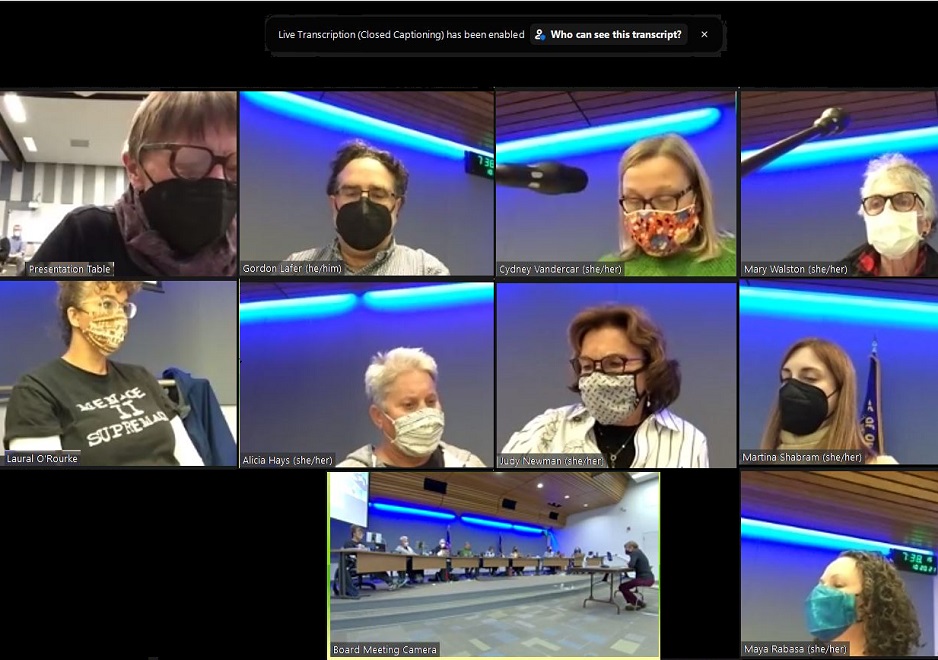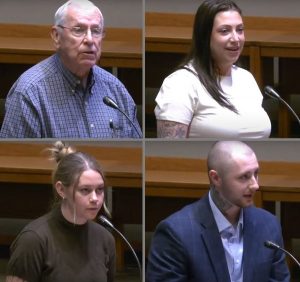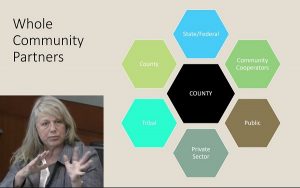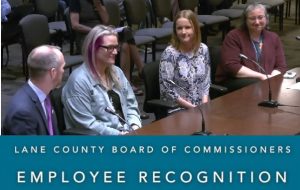4J school board comments: Disagreement is not disrespect
7 min read
Public comment focused on curriculum adoption and reaction to the 4J admin staff's absence from board meetings.
Eugene School District board chair Judy Newman: And now it’s time for items raised by the audience. The first person is Larry Lewin.
[00:00:09] Larry Lewin: There is a thing called bipartisanship, that despite differences in philosophy, elected officials find ways to vote to solve problems. This board was able to achieve that. After decades of inequity for students of minority religions, you came together to craft a fair policy on their holidays. With the Black Lives Movement against policing abuses, you voted to redo our school district safety policy. You heard the need to increase the wages of our bus drivers, and you acted to fix that. And last week you recognized the immense need building staff had for a catch-up day, this past Monday, and you did it a week early.
Veteran board members, this is far healthier than suspecting the worst of your newer colleagues. Accept the differing perspectives here, board members. Understand that it’s not disrespectful to disagree, that dialoguing is not about hurt feelings, and criticizing policy is not acting personally. Recognize the new reality of the composition of the school board and come together to solve the problems in front of you.
[00:01:13] Stefan Ostrach: My name is Stefan Ostrach. I’m very concerned about a serious lack of transparency around Dr. Vandercar’s decision to direct her administrative staff not to attend board meetings at your meeting on October sixth. The interim superintendent explained that decision by referring to staff and workers not being treated with respect by board members. That comment was reported on the front page of the Register Guard. The situation further escalated recently when the Eugene Weekly, approving of the interim superintendent’s action, accused one particular board member of “spilling blood” in this boardroom. I have not received any answer to my repeated requests for specifics as to who said what, when so I have filed a formal public information request with the district in a way to prompt answer through that means.
Thank you for supporting
local citizen journalism
[00:02:04] Ericka Thessen: My name is Ericka Thessen and as the district is making choices about a new curriculum for language arts and social studies for our K-5 students. it is of the highest importance in my mind that we choose a curriculum that centers robust and diverse histories, experiences, and viewpoints, and not just Anglo- or European- centric ones; by not sanitizing, erasing, or glossing over historically accurate and culturally competent teaching of subject matters, especially about American history. I would want curriculum that shares the history and experiences of BIPOC peoples, and our indigenous communities, as these viewpoints are so critical to the present and future of our nation.
About the decision not to have central staff at board members. When I have questions and really want to understand a process or policy, I would want to go to the people who were the experts and who I trusted the most to get the answers. I don’t feel it’s disrespectful, but in fact, very much the sign of the utmost respect to ask the leaders of our district, how we can better serve our students, staff, and communities. And one last thing I’m so glad to hear about the mental health services and programs that you guys are working on. Thank you. Keep doing that.
[00:03:11] Judy Newman: The next speaker is Jerry Rosiek.
[00:03:13] Jerry Rosiek: Interim Superintendent Vandercar recently decided the 4J administrative staff would no longer answer questions in person at 4J board meetings. I have watched or listened to every board meeting since May, I read the transcripts, I can find no remark that was in any way disrespectful to 4J staff. 4J staff were asked if instead of recommending only one curricular option, they could recommend two and permit teachers to use their judgment about what is best for students at their school. I am here today to say, this is exactly the type of questions I want my board members to be asking. Many of us in the community voted for our four newest board members because we have been frustrated with the creeping centralization of educational decision making in the district.
There are widespread concerns about the direction the district is headed. Natalie Wexler, author of The Knowledge Gap, argued children need a shared knowledge base in order to learn basic reading skills. Wexler’s conception of necessary knowledge is extremely regressive, narrowly Eurocentric, potentially upper-class, violently assimilationist, possibly heteronormative, and smacks of white savior complex. It reads like a Martha Stewart magazine version of curriculum.
Many teachers in our district do not feel safe raising such concerns, however, because anyone who questions the 4J administration is responded to defensively and sometimes punitively. Superintendent Vandercar confirmed those fears by treating the board’s questions as personal attacks and restricting lines of communication.
[00:04:31] Judy Newman: Our next speaker is Justin McCall.
[00:04:34] Justin McCall: My daughter was injured on Friday the 24th of September. She got off the bus limping and had a bruise on her face. We called the school. Nobody would admit it. Our daughter told us it happened at school. I contacted you Cydney about this and you brushed it under the rug. Now I’m here to demand your resignation because all you guys want to do is silence me and my wife and put me and my wife on a gag order. This is not how you run a school. Our children are the most important. And we have a teacher trying to coerce my child and tell her that ‘That’s not what happened to you,’ when it is. Now there’s been lies and cover ups and it’s on all of you because you all, according to the laws and rules, you all have the power to get rid of her.
[00:05:25] Brenda Kame’enui: My name is Brenda Kame’enui. One of many important issues the district addresses this year is adoption of a new reading curriculum. Representative culturally appropriate inclusive curriculum is essential to any adoption. I understand the reading committee is using a research based rubric. Beginning of reading has the most reliable, scientifically based research in all of education. Research points to five big ideas essential to teaching beginning readers: phonological awareness, alphabetic insight and phonics, vocabulary, reading fluency, and reading comprehension. Timing and delivery of these essential skills is critical. I will forward to the board five technical guidelines I consider essential to curriculum adoption and delivery.
[00:06:16] Lisa Crank: My name is Lisa Crank. To expand and support CTE programs: Graduation rates for Lane County are around 73%. For 4J students that participate in two or more CTE classes, the rate is 90%. CTE programs give kids a new sense of purpose to their education and a preview of future possibilities, not to mention that the CTE teachers at North Eugene High School are rockstars. Manufacturers in Lane County are struggling to fill skilled labor positions, Oregon Labor Commissioner Val Hoyle was quoted last week is saying we have job openings that pay a hundred thousand dollars a year but we don’t have the candidates to fill these positions.
[00:06:52] Roscoe Caron: Roscoe Caron. Our world is shaped by time and place, and so it is with education. Our geographic proximity to the U of O resulted in local districts serving as laboratories. Programs such as direct instruction and behavioral-based discipline programs were piloted in our schools and eventually sold for large sums of money to education-related corporations. Here’s the thing. In our district, there’s been no real allowance to question these things. Teachers are not allowed to share their professional judgment about standardized testing. I recall no opportunity as a teacher to question the efficacy or ethics of behaviorism in special education or in standardized testing, for example, it wasn’t done. I believe we paid a tremendous price for not allowing real questioning about all of this. Now we have a school board being punished for asking too many questions. The price of silencing questioning is a steep one to pay.
[00:07:53] Derek Ross: I’m a parent of three kids in the 4J district who are currently wearing masks at schools, both indoors and out, every day. The looming threat we feel as protectors of these kids is the federal agenda to implement the COVID vaccines to 5-to-18-year-olds. Is this board considering the unknown long-term risks of forcing facial masks and vaccines on our children? Should such unnecessary risk be imposed by a school district on its children, as children’s risk of harm from COVID are so much lower and the potential for spreading is virtually no different either way?
[00:08:26] Sabrina Gordon: My name is Sabrina Gordon and I am president of Eugene Education Association. When things get overwhelmingly difficult, it helps to focus on the most important lessons we want our students to learn, lessons such as critical thinking, including asking questions. Perseverance and problem solving even when it’s difficult or uncomfortable. And self-advocacy including asking for help when our students need it.
As the adults in the 4J community, we need to ask ourselves whether we’re practicing these fundamental skills. I’ve seen this board staying engaged in difficult issues and working through them, even when it’s uncomfortable; it’s not your job to say yes all the time or to make the work look easy. I believe it is important for district staff to be present and engaged at the board level. Teachers and principals don’t get to stay home when faced with questions or disagreements. District admin need to be present here to answer questions and engage with the officials elected by our community. And the final system self-check. Are we being transparent enough about the difficulties we’re experiencing this year? Our community needs to know this reality, so they’ll be ready to stand together with us when we ask for help.



